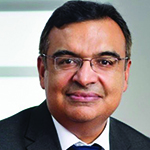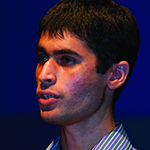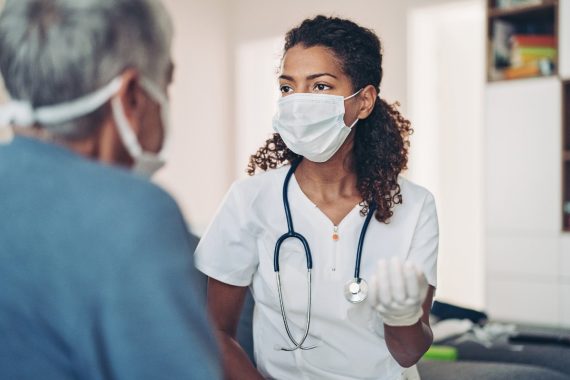
Yes
Face-to-face consultations are still the gold standard
Dr Irfan Malik, GP partner, Nottingham
The media and NHS England criticism triggered by the lack of face-to-face GP appointments has been harsh. However, I can see how it has developed. The protests of the patients became stronger and stronger. And while I’m sure that many GP surgeries continued to offer face-to-face assessments, I know this has been impossible in some places.
The move to ‘total triage’ was certainly appropriate at the time. And remote assessments have secured a place in the future of primary care.
But the face-to-face consultation remains the gold standard. And it is not just good for patients – it is important for us. Having worked in general practice for 25 years, predominantly seeing patients face to face, I haven’t really enjoyed the recent switch to remote consultations. What’s more, I fear that it will shorten my career due to a lack of job satisfaction.
The advantages of face-to-face consultations include: improved patient satisfaction; building and maintaining the doctor-patient relationship; reduction of barriers to care; better assessment of complex health needs; and picking up of softer cues and hidden agendas. In the longer run, seeing patients in person will actually reduce the number of contacts with the practice, and prevent a multitude of phone calls with various clinicians.
I also feel that total triage has made it harder to access care for patients with language difficulties, mental health issues, multiple morbidities and disabilities. A certain level of articulation is required for a patient to benefit fully from a phone consultation. Moreover, the reduction in face-to-face consultations has had an impact on GP training. Registrars have a reduced experience of seeing and examining patients. And then there are the missed or delayed diagnoses, including cancer, and safeguarding issues. No doubt there will be an increase in complaints and medicolegal cases as a result.
Most of all, the switch to total triage has been a public-relations disaster for general practice. GPs were perceived as becoming distant and less accessible. The locking of front doors and use of intercoms put up further barriers to the public. Many patients mistakenly assumed that we were closed. The gulf between GP services and patient expectations has never been wider, and high-profile media articles have inflamed this further.
Seeing patients face to face is important both for patients and GPs. We cannot let the digital revolution erode these benefits.

No
GPs are just doing what the Government advises
Dr Zishan Syed, GP partner in Kent and member of Kent LMC, the BMA and the GPC. He is writing in a personal capacity
GPs do not need to provide more face-to-face appointments because we are already providing an adequate number.
GPs have been doing precisely as requested of us by the contract through NHS England. During this pandemic, NHS England clearly directed us to change our way of practice, and to rely predominantly on a remote-consulting model. Former health secretary Matt Hancock made this absolutely clear, so there are no doubts regarding the matter. As time progressed, more was expected of GPs, in the form of delivering a mass vaccination programme at very short notice – which was very poorly resourced.
GPs have performed remarkably, but despite this, NHS England sought to appease certain sections of the media by sending a damaging letter signed by medical directors Dr Nikki Kanani and Ed Waller. The catastrophic result of that letter has led to numerous media outlets spouting a misinformed message about GP surgeries being shut. This is entirely false – our doors have always been open. What has changed is that face-to-face access is being limited to those with genuine clinical need through triage.
Challenge and change are never welcome. For the first time, the NHS is actively challenging patients about their desire, rather than clinical need. Because of the UK’s religion-like fanaticism towards the NHS, politicians have shied away from challenging patients’ expectations, to the detriment of the nation’s welfare.
GPs are highly trained professionals but politicians and the media do not respect our expertise. We have finite time during the day. If we now are expected to do more face-to-face work on top of what we are already contractually doing, we will burn out further, and this will be the end of general practice as we know it. I am alarmed by the numbers of GPs who are telling me that they wish to walk away from the NHS following the abuse they have received by the public regarding this false narrative.

















Totally agree with you Irfan!
“GPs do not need to provide more face-to-face appointments because we are already providing an adequate number”.
The weight of this argument has me convinced- not. Who is the arbiter of what constitutes “adequate”?
“What has changed is that face-to-face access is being limited to those with genuine clinical need through triage”.
I have been working for an OOH provider and have been happily seeing patients face-to-facer, and my experience, repeatedly, is that triage as it is largely being conducted, is failing to identify many instances of genuine clinical need.
This whole issue is much more nuanced than a simple yes/no scenario, and we all know that an under-manned service will always be inadequate, but I do wish that the weakness of the triage-first model would be honestly recognised. Much of what I have seen being provided to patients has been woeful.
The problem with Irfan is that whilst he is not offering a full service to his patients, he expects to be paid as if he were.
Agree with Irfan. We should see our patients in person. If the system is so close to collapse that we cannot do so, something else needs to change to control demand (attempts to increase supply have failed). U.K. patients consult far more frequently than in certain Scandinavian countries. We should look at what they do to manage their demand in primary care.
Patients have to pay towards their medical care and the cost varies in different parts of Sweden. Example costs include: GP appointments: 100 to 300 Swedish krona. … hospital stays: 100 Swedish krona.
No one cares one but if you do more. You’ll still have to do more. Wake up.
The problem with Zishan is that whilst he is not offering a full service to his patients, he expects to be paid as if he were.
We should be offering a full face to face service. We are already paid more than adequately. Money is not the issue
Could we do more to see patients f2f? Yes, but not without compromising timely access.
Do we really want to go back to patients queueing out the door and waiting for weeks to see a GP, only to find out that they needed a blood test first or should have seen a physio/ optician/ dentist/ mental health worker.
Does offering a face-to-face service make it “service”!?
My practice having been doing a Clinician-led, telephone based appointment service for ten years. This puts the most senior, highly trained clinicians in charge of deciding who gets seen (either f2f or video) and in what order – need, not want – and who gets dealt with (f2f, by video or by telephone) by somebody else.
To comment that by putting a patient directly in contact with a senior clinician in order to allocate finite resource isn’t offering a “full service” misses the issue of capacity.
Telephone and video consultations are still work and we do more of them, but they free up capacity for face-to-face consultations because the clinician gate-keeps their own appointments.
Total triage also means that when we do see patients (f2f or by video) our waiting and contact times are reduced, thus helping with infection control. It also means we’re not dragging immobile elderly down to the practice unnecessarily.
Our patients now value the system, but it took over a year to refine our processes and for patients to become confident that if they need seen they will get seen (quickly).
If it’s working for you then publicise the positives; if it’s not, then by all means do something different, but just because you’re allowing patients open access to a face-to-face consultation doesn’t necessarily equate to better access to high quality primary care.
‘just because you’re allowing patients open access to a face-to-face consultation doesn’t necessarily equate to better access to high quality primary care.’
Absolutely spot on Keith!
Fantastic summary Keith
We all know capacity issues force us to work in this way and it is the only way to provide any kind of service.
How fulfilling it is for a GP is a whole other discussion. I used to really enjoy my Saturday morning session of only face to face patients at 15-minute intervals. Yes – maybe more than 50% of patients didn’t need to physically be there. But I wasn’t challenged by multi-tasking and decision fatigue as I am now.
We need a middle ground but I don’t think we have established where the perimeter is yet.
The reality is that most surgeries could not allow a return to all face to face appointments as we cannot have 30-40 people socially distancing in the waiting room! Many things can be dealt with over the phone or by video, email, or pictures. Because waiting times are reduced it can actually be a better service. When things change people don’t like it and they complain; fewer house visits, antibiotics only when needed, more nurses seeing patients, doctors dropping out of hours. Dare I say it even having female or even non-white doctors!. However in time people will get used to it and accept change.
No next question.